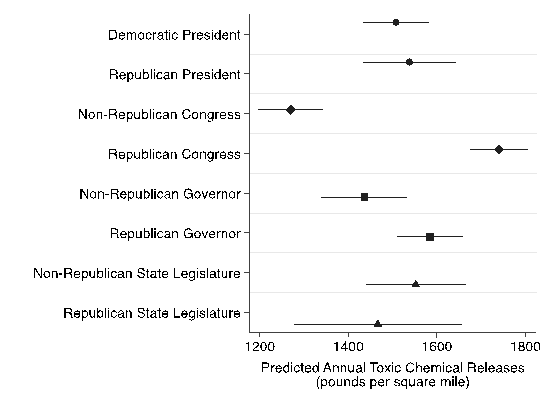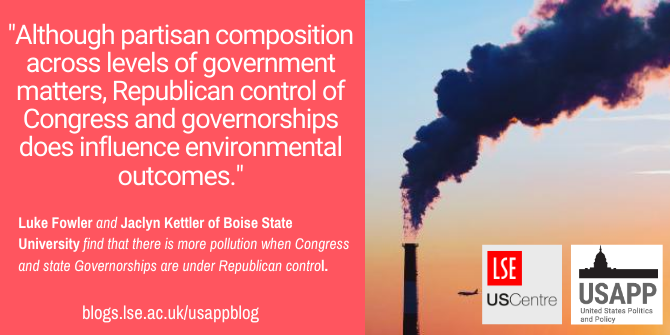
 Republican politicians have been portrayed traditionally as having less concern for the environment, but what does the evidence say about the GOP and pollution? In new research, Luke Fowler and Jaclyn Kettler examined 20 years’ of data on state-level toxic waste releases. They found that there was likely to be more pollution when the US Congress and state Governorships were held by Republicans, and that pollution was lower when these institutions were held by Democrats.
Republican politicians have been portrayed traditionally as having less concern for the environment, but what does the evidence say about the GOP and pollution? In new research, Luke Fowler and Jaclyn Kettler examined 20 years’ of data on state-level toxic waste releases. They found that there was likely to be more pollution when the US Congress and state Governorships were held by Republicans, and that pollution was lower when these institutions were held by Democrats.
In contemporary American politics, Republicans have largely been cast as the villains when it comes to environmental issues, especially as President Trump dismantles the Environmental Protection Agency (EPA), Republican members of Congress vote against environmental legislation, and climate change denial still factors into party rhetoric. However, the complicated nature of the federal system and environmental policy may limit the influence of Republican partisan control on environmental outcomes. While others have thoroughly examined Republican rhetoric and record on the environment, we ask: does Republican leadership translate into more pollution?
Historically, Republicans have been pragmatic on the environment, with Richard Nixon creating the EPA and ushering in the modern age of environmental policy and keystone legislation, such as the Clean Air Act of 1970, which was supported by bipartisan majorities. In recent decades, however, clear partisan differences on environmental issues have emerged as shown by diverging positions in the party platforms and polarized public opinion. While similar to the growing partisan and ideological polarization on many issues, the role of corporate interests and conservative activists have pushed the Republican Party to the right on environmental issues. As a result of these partisan divisions, similar to the popular perception, we expect Republican administrations to result in worse environmental outcomes.
Poorer outcomes for the environment when Republicans run things
Despite this straightforward expectation, implementing environmental policy in the US is a complicated affair that includes both national and state institutions, which may complicate what happens on the ground. Most federal environmental programs are managed through a partial preemption system by which the EPA delegates primary implementation authority to state environmental agencies, who are then responsible for the day-to-day operations but must comply with minimum standards. At the national-level, Congress adopts environmental regulations into law, provides resources for their implementation, and has oversight power to ensure that the executive branch is faithfully complying, and the President has executive control over EPA that allows him to direct both the rulemaking processes and how they collaborate with their state counterparts. At the state-level, legislatures and governors share similar legislative and executive powers to their national counterparts, respectively, but are positioned to more directly oversee and control the action of state agencies and the individuals working on the frontlines of environmental regulation. Notably, more than 40 percent of state spending on natural resource programs is funded through federal grants-in-aid, meaning that states are highly dependent on the federal government to fund these programs.
Using a dataset of state-level toxic chemical releases from 1993 to 2012, we were able to test the effects of Republican control of national and state executive and legislative branches (President, Congress, Governor, State Legislatures) on the concentration of pollution in states. Our findings indicate that while Republican Congresses and governors are correlated with higher pollution concentrations, there are no generalizable difference when it comes to Republican presidents and state legislatures, compared to Democratic control or divided partisan control of those offices (Figure 1). Specifically, pollution concentrations tend to be 10 percent higher under Republican governors and about 37 percent higher under Republican Congresses, based on the average pollution concentration in our dataset. Unsurprisingly, when we re-ran these models to test the effects of Democratic control, we found the opposite effect in that Democratic Governors and Congresses were correlated with lower pollution concentrations.
Figure 1 – Predicted state-level pollution outputs for Republican and non-Republican control

Note: Comparison is between Republican and non-Republican for Congress, Governor, and State Legislatures, which may include divided partisan control in state legislatures or Independent governors.
Photo by Thijs Stoop on Unsplash
Adding a complicating factor here are the vertical and horizontal checks and balances that exist within US political institutions, so we also tested different scenarios of partial control of national and state offices. Based on these analyses, we find that the most impactful scenario is a combination of Republican Congresses and Governors, which is correlated with about 29 percent higher pollution concentrations. In general, any partisan scenario that includes a Republican governor or a Republican Congress tends to be correlated with higher pollution concentrations, than scenarios without one or both. This would largely suggest that the gubernatorial control over state environmental agencies, and Congressional control over federal environmental spending play the most important role in dictating how effective environmental regulations are in limiting pollution.
What about presidents? Interestingly, we did not find that Republican presidents are correlated with higher pollution concentrations. But, there are two important limitations to this. First, our data only compares Bush, Clinton, and Obama, so it is difficult to make inferences about partisanship in the White House when there is such a limited sample size. Notably, EPA did not start collecting toxic release data until 1987, so it is not possible to make a broader comparison across modern presidents. Second, our data does not include Trump, who has taken a more aggressive approach to dismantling environmental regulations than any other Republican president in modern history. Thus, while we can confidently say that Republican Congresses and Governors are correlated with more pollution, it is difficult to say what impact partisanship in the White House has without a bigger data sample, so only time will tell on this one.
Although partisan composition across levels of government matters, Republican control of Congress and governorships does influence environmental outcomes. While the Trump administration’s approach to environmental policy has garnered the lion’s share of attention in the last few years, other national and state leaders also play pivotal roles in protecting America’s natural resources. Like all elections, the outcomes of the 2020 election are likely to significantly affect the environment in the United States. Thus, heading into November, it is important to remember that there are elections other than the president that matter in policy and affect outcomes.
- This article is based on the paper, ‘Are Republicans Bad for the Environment?’ in State Politics & Policy Quarterly.
Please read our comments policy before commenting.
Note: This article gives the views of the author, and not the position of USAPP – American Politics and Policy, nor the London School of Economics.
Shortened URL for this post: https://bit.ly/3jkpchL
About the author
 Luke Fowler – Boise State University
Luke Fowler – Boise State University
Luke Fowler is an associate professor and director of the Masters of Public Administration program at Boise State University in Boise, Idaho. His research interests include state and local politics, intergovernmental relations, environmental policy, and policy implementation.
 Jaclyn J. Kettler – Boise State University
Jaclyn J. Kettler – Boise State University
Jaclyn J. Kettler is an assistant professor of political science at Boise State University in Boise, Idaho. Her research interests include state politics, political parties and interest groups, campaign finance, and women and politics.






